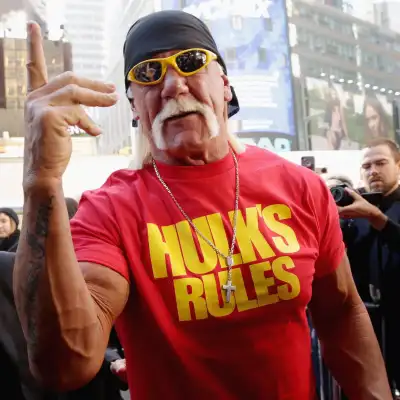The Controversial Legacy of Hulk Hogan Before His Death at 71
Wrestling icon Hulk Hogan's final years were marred by controversy, legal battles, and public backlash that overshadowed his once-heroic persona.
Hulk Hogan, one of professional wrestling’s most recognizable figures, passed away at the age of 71, leaving behind a complicated legacy that has sparked debate among fans and critics alike. While his contributions to the rise of wrestling as a mainstream form of entertainment in the 1980s and 1990s are undisputed, the final years of his life were filled with controversies that fundamentally reshaped how the world remembered him. Born Terry Eugene Bollea, Hogan became the face of the World Wrestling Federation (now WWE) during its meteoric rise in the 1980s.
Known for his larger-than-life persona, signature catchphrases, and unmatched charisma, Hogan was instrumental in turning pro wrestling into a household phenomenon. He starred in television shows, movies, and commercials, becoming an icon whose appeal crossed generational and cultural boundaries. For many, Hulkamania was more than just a slogan—it was a lifestyle.
However, as time went on, the man behind the character began to show cracks that would lead to public scrutiny and media scandal. One of the most notable controversies surrounding Hogan stemmed from a leaked sex tape in 2012, which quickly spiraled into a full-blown scandal. The tape not only invaded his privacy but also captured him using racially charged language that led to his suspension from WWE and near-total erasure from the organization’s platforms.
WWE removed Hogan from its Hall of Fame webpage, ceased selling his merchandise, and avoided referencing him in programming. The backlash was swift and intense. Fans who once adored him were divided—some believed he should be forgiven, while others saw his comments as unacceptable and irredeemable.
Hogan later apologized publicly and stated that his remarks did not reflect his true beliefs. Nonetheless, the damage to his reputation was done. The scandal had ripple effects beyond WWE.
Endorsement deals were pulled, and public appearances were canceled. His image—once that of the clean-cut, all-American hero—was permanently altered. Although WWE reinstated him into the Hall of Fame in 2018 and allowed him to return to limited programming, many fans and wrestlers still held deep reservations about his re-emergence.
Another source of controversy was Hogan's lawsuit against Gawker Media, which published the infamous sex tape. The legal battle, funded in part by billionaire Peter Thiel, became a landmark case in the fight over privacy, press freedom, and media accountability. Hogan won the case and was awarded $140 million in damages, which effectively bankrupted Gawker.
While some viewed the win as a triumph for personal rights, others criticized it as an attack on journalistic freedom. The trial itself became a media circus, with daily updates and televised segments further feeding the public’s complex relationship with the former wrestling star. Hogan's legal team argued that the publication of the tape was an invasion of privacy and emotional distress, while Gawker maintained it was within its First Amendment rights to publish the content.
The jury sided with Hogan, making it one of the most high-profile legal cases involving a celebrity and the media in recent memory. Outside the courtroom, Hogan also drew criticism for his on-again, off-again relationship with the WWE. While his returns were often promoted as triumphant comebacks, many within the wrestling industry—including former wrestlers and commentators—expressed discomfort about his presence.
Prominent figures like Mark Henry and The New Day spoke out publicly, questioning the sincerity of his apologies and whether his reinstatement sent the wrong message about accountability and inclusion in the industry. Despite this, WWE occasionally used Hogan’s image to boost nostalgia-driven programming, showcasing how conflicted even the company was about his legacy. Hogan’s personal life also became a topic of tabloid fodder, particularly following his tumultuous divorce from Linda Hogan and strained relationship with his children.
The divorce, finalized in 2009, included allegations of infidelity, financial mismanagement, and emotional turmoil. His son, Nick Bollea, was involved in a 2007 car crash that left his friend permanently disabled, adding further public scrutiny to the Hogan family. Although Hogan was not directly involved in the accident, the incident brought renewed attention to the family's private struggles and raised questions about parenting, fame, and responsibility.
In interviews during the latter part of his life, Hogan often portrayed himself as a man seeking redemption. He expressed regret over past mistakes, spoke of spiritual growth, and emphasized his desire to be remembered not just for his achievements in the ring but for his resilience in the face of adversity. Some fans appreciated his candidness, while others remained skeptical, citing his repeated involvement in controversies as a sign of deeper character flaws.
In recent years, Hogan tried to rehabilitate his image through charity work and by mentoring younger wrestlers behind the scenes. He also made occasional appearances at fan conventions and nostalgia events, where his popularity remained high among older fans who grew up watching him. However, his legacy remained polarizing, often dividing audiences between those who admired his wrestling contributions and those who could not overlook his personal missteps.
Hogan’s death at the age of 71 triggered an outpouring of tributes from fans, celebrities, and fellow wrestlers. WWE released an official statement acknowledging his immense influence on the industry and expressing condolences to his family. Social media was filled with both heartfelt remembrances and pointed critiques, reflecting the duality of his legacy.
For every post celebrating Hulkamania, there was another questioning the ethics of lionizing a figure whose personal conduct had caused real harm. The debate over how to remember Hogan is emblematic of a broader cultural reckoning with legacy and accountability. As society becomes more aware of the complexities behind public figures, the line between admiration and criticism becomes increasingly blurred.
Hulk Hogan, in many ways, epitomized that struggle. He was a man who reached the highest peaks of fame and influence, only to see it jeopardized by his own actions. The story of Hulk Hogan is not just about wrestling.
It is about celebrity, redemption, downfall, and the human cost of living in the public eye. His rise and fall serve as a cautionary tale about the perils of fame, the consequences of words, and the challenges of rebuilding a public persona after scandal. While his accomplishments in the ring will be remembered by many, his legacy will forever be intertwined with the controversies that marked his later years.
As the world reflects on his life, the question remains: can greatness and moral failure coexist in the same legacy? For Hulk Hogan, that question may never have a simple answer. In the end, his story is as much about the fans and the culture that shaped him as it is about the man himself.
23th july 2025



